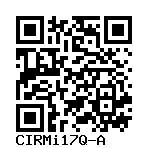CW20141
CIRMi17Q-A
General
Cell Line |
|
| hPSCreg name | CIRMi17Q-A |
| Cite as: | CIRMi17Q-A (RRID:CVCL_HH17) |
| Alternative name(s) |
CW20141
|
| Cell line type | Human induced pluripotent stem cell (hiPSC) |
| Similar lines |
|
| Last update | 13th March 2024 |
| User feedback | |
Provider |
|
| Generator | California Institute for Regenerative Medicine (CIRM) |
| Owner | California Institute for Regenerative Medicine (CIRM) |
| Distributors | |
| Derivation country | United States |
External Databases |
|
| BioSamples | SAMEA115402214 |
| Cellosaurus | CVCL_HH17 |
| Wikidata | Q54815231 |
General Information |
|
| * Is the cell line readily obtainable for third parties? |
Yes Research use: allowed
Clinical use: not allowed
Commercial use: allowed
|
Donor Information
General Donor Information |
|
| Sex | male |
| Age of donor (at collection) | 5-9 |
Phenotype and Disease related information (Donor) |
|
| Diseases | A disease was diagnosed.
|
External Databases (Donor) |
|
| BioSamples | SAMEA115402215 |
Ethics
| Has informed consent been obtained from the donor of the embryo/tissue from which the pluripotent stem cells have been derived? | Yes |
| Was the consent voluntarily given? | Yes |
| Has the donor been informed that participation will not directly influence their personal treatment? | Yes |
| Can you provide us with a copy of the Donor Information Sheet provided to the donor? | No |
| Do you (Depositor/Provider) hold the original Donor Consent Form? | No |
| If you do not hold the Donor Consent Form, do you know who does? | Yes |
| Please indicate whether the data associated with the donated material has been pseudonymised or anonymised. | pseudonymised |
| Does consent explicitly allow the derivation of pluripotent stem cells? | Yes |
| Does consent prevent CELLS DERIVED FROM THE DONATED BIOSAMPLE from being made available to researchers anywhere in the world? | No |
| How may genetic information associated with the cell line be accessed? | Controlled Access |
| Will the donor expect to receive financial benefit, beyond reasonable expenses, in return for donating the biosample? | No |
| Has a favourable opinion been obtained from a research ethics committee, or other ethics review panel, in relation to the Research Protocol including the consent provisions? | Yes |
| Name of accrediting authority involved? | Stanford University |
| Approval number | 27290 |
| Has a favourable opinion been obtained from a research ethics committee, or other ethics review panel, in relation to the PROPOSED PROJECT, involving use of donated embryo/tissue or derived cells? | Yes |
| Name of accrediting authority involved? | Stanford University |
| Approval number | 27290 |
| Is there an MTA available for the cell line? | Yes |
hIPSC Derivation
General |
|
| Source cell type |
A cell found predominately in the blood.
|
| Age of donor (at collection) | 5-9 |
Reprogramming method |
|
| Vector type | Non-integrating |
| Vector | Episomal |
| Is reprogramming vector detectable? |
No |
Vector free reprogramming |
|
Other |
|
| Derived under xeno-free conditions |
Unknown |
| Derived under GMP? |
Unknown |
| Available as clinical grade? |
Unknown |
Culture Conditions
| Medium |
Essential 8™
|
Characterisation
Analysis of Undifferentiated Cells
| Marker | Expressed | Immunostaining | RT-PCR | Flow Cytometry | Enzymatic Assay | Expression Profiles |
| POU5F1 (OCT-4) |
Yes |
|||||
| NANOG |
Yes |
|||||
| LIN28 |
Yes |
Undifferentiated cells were analyzed by proprietary assays approved by California Institute of Regenerative Medicine (CIRM) as described in the attached publication. Pluripotency of established iPSC cultures were tested by qPCR on bulk samples using 48 genes including standard pluripotency genes (listed above). Samples were assigned a passing score after analysis with a non-supervised classifier based on an appropriate sample set. (Novak, T. 2015. Drug Discovery World pp. 47-53.)
Differentiation Potency
Microbiology / Virus Screening |
|
| HIV 1 | Negative |
| HIV 2 | Negative |
| Hepatitis B | Negative |
| Hepatitis C | Negative |
| Mycoplasma | Negative |
Genotyping
Karyotyping (Cell Line) |
|
| Has the cell line karyotype been analysed? |
Yes
Normal
|
Other Genotyping (Cell Line) |
|


Login to share your feedback, experiences or results with the research community.